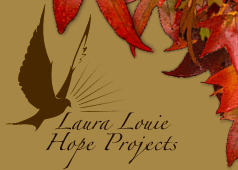
|
The Mae On Project is a pilot project using acupuncture for symptom relief and improved quality of life in people living with HIV/AIDS (PLHIV) in northern Thailand.
The first case of AIDS in Thailand was recorded in 1984 ( 1 ). Widespread transmission of the virus is believed to have hit epidemic proportions in the late 1980s, especially among injection drug users (IDU) and sex workers. The disease soon proliferated amongst other populations causing increasing concern for healthcare workers and government officials who initiated successful educational and treatment programs in the early 1990’s. At the end of 2005, the population of Thailand was around 65 million with approximately 560,000 adults and 16,000 children estimated to be living with HIV. Twenty-one thousand individuals were estimated to have died of AIDS related disease in this year alone. The northern region was found to have the highest prevalence of HIV in the country. At the end of June 2005, the number of people undergoing antiretroviral (ARV) therapy was estimated to be between 67,000 and 82,000 ( 2 ).
|
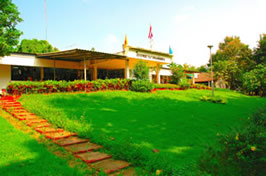 |
| Mae On Hospital, Thailand |
The idea for the Mae On Project was conceived in 2002 by Canadian naturopathic physician and acupuncturist Dr. Laura Louie, while visiting Mae On Hospital, a rural community hospital, located approximately 35 km east of Chiang Mai.
Dr. Louie volunteered her services and provided free acupuncture treatments to HIV/AIDS patients at the hospital. Within 2 to 4 sessions, her Thai patients experienced a considerable decrease in HIV and ARV related symptoms, which led to a significant improvement in their quality of life. Based on this dramatic result, Dr. Louie collaborated with Mae On Hospital to develop a clinical program to train nurses in the administration of acupuncture treatments for HIV/AIDS patients in this rural region as well as to set up an acupuncture clinic at their hospital.
The Mae On Project was officially launched in April 2004
with three main objectives:
- To develop a pilot program to train medical staff in acupuncture as adjunctive treatment for HIV/AIDS patients at Mae On Hospital in northern Thailand.
- To create a free clinic at Mae On Hospital to provide acupuncture for people living with HIV/AIDS.
- To undertake an evaluative pilot study using quantitative and qualitative data to assess the efficacy of acupuncture on quality of life, the symptoms of chronic HIV infection and the side effects of anti-retroviral therapies.
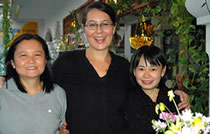 |
| Dr. Laura Louie, ND, with Thai Nurses, Ms. Duangdean Ruensa and Ms. Unchalee Pultajuk |
Initially two Thai nurses volunteered for training in basic acupuncture. Teaching was conducted by three traditional Chinese medicine (TCM) practitioners – Dr. Laura Louie, Dr. Rungrat Pawaradhisan and Dr. Sudhisak Pawaradhisan. The nurses received 110 hours of didactic training in acupuncture over a 4.5 month period. The training was conducted in two phases. The first phase focused on fundamentals of TCM, acupuncture points and meridians, and diagnosis using TCM criteria. The second phase emphasized acupuncture therapeutics and clinical skills. Clinical training consisted of supervised weekly acupuncture for HIV patients over six months.
Once the clinic opened in August 2004, thirty-two people in various stages of HIV-infection regularly attended weekly acupuncture treatments in a group out-patient setting.
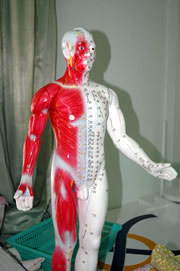 |
| Acupuncture Model Outlining Acupuncture Points and Meridians |
To assess the efficacy of the acupuncture treatment, a non-randomised, single-arm study was carried out over a six month period. Twenty seven HIV-positive participants with stable medication use and no significant morbidities were enrolled in this study, which began in August 2004.
Overall, the findings of the study suggested that acupuncture may be beneficial to people living with HIV/AIDS in this rural region, improving physical symptoms and quality of life. The project demonstrated the feasibility of establishing and maintaining a hospital-based acupuncture clinic for people living with HIV/AIDS in a rural area. This low-cost intervention program was established in fewer than twelve months and utilized local nursing staff. The project confirmed that acupuncture was acceptable to this population, with many participants requesting that similar clinics be started in other districts in order to accommodate those HIV patients who were unable to travel to the Mae On Hospital.
The director of Mae On Hospital and the head nurse of the HIV/AIDS program expressed great satisfaction with the acupuncture program, requesting training for more nurses. Thus far, five nurses have received basic training in the Projectss of traditional Chinese medicine and acupuncture. The acupuncture clinic continues to run on a weekly basis at the Mae On Hospital.
The results of the first phase of the Mae On Project have been published in the Autumn 2006 issue of HIV Nursing (please see Presentations & Publications Page for details).
Following are some quotes from participants in the Mae On Project study:
“Acupuncture is very good because it helps to reduce or get rid of any symptoms we may have without having to depend on medicines. I’m already taking anti-retroviral therapy. If I had to take pain killers for back pain or medications for numbness, I feel I’m putting more chemicals in my body and I worry that all these drugs combined together could have a bad effect on the body. Acupuncture is a way to treat myself without having to take extra medications and it’s also effective at the same time.”
“Prior to having acupuncture I was aware of the symptoms and this would cause me some stress. But now that these symptoms have eased, almost gone, I don’t think about this anymore and consequently feel emotionally and spiritually better. And I can also look to the future with greater hope because I don’t have to worry about these symptoms anymore.”
“Acupuncture increases my hopes and aspirations and gives me encouragement, strengthens me. I have something to lean on. If I don’t come here, I feel like I’ve left something out of my life….”
“Since acupuncture, I don’t think about more getting sick, because I feel ‘normal’. But if I get sick, I feel confident that acupuncture can help.”
The nurses who trained in acupuncture also had strongly positive comments about the project. And this is one of them:
“I feel honoured to have been able to participate in the (acupuncture) program. It’s provided an opportunity for me to help many people. A program like this can’t be found anywhere else in Thailand.”
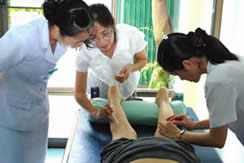 |
| Dr. Rungrat Pawaradhisan Teaching Clinical Acupuncture Skills to Thai Nurses at Mungkala Clinic in Thailand |
The Mae On Project is a grassroots effort that functions in the hands of the medical staff at Mae On Hospital – meaning that it’s sustainable. The acupuncture clinic has been running weekly for over four years now and has provided more than 900 treatments for people living with HIV/AIDS in this rural region of Thailand. Because the Mae On Project has achieved its goal of sustainability, it is Dr. Louie’s expectation that her involvement will decrease.
“Although our project makes a small impact on worldwide AIDS numbers, it has made a very tangible difference in small communities of HIV patients and their families” according to Dr. Louie.
 |
The Laura Louie Hope Projects will continue to provide the acupuncture materials, financial assistance for the acupuncture clinic, on-going acupuncture education and abundant encouragement. The acupuncture clinic at the Mae On Hospital is staffed by locals and continues to provide high-quality medical care to patients on a weekly basis.
At this time, the Mae On Project is the only acupuncture clinic in a community hospital, in Thailand, that is dedicated specifically to treating people living with HIV/AIDS. It continues to provide acupuncture treatments free of charge. |
 |
Footnotes
1. In this paragraph , all the statistics with the exception of the numbers noted in the last sentence were taken from www.avert.org/aidsthai.htm. This website was accessed on September 5, 2006.
2. The statistics for this sentence on ARV therapies was taken from a document prepared by UNAIDS and The World Health Organization in June 2005 titled Progress on Global Access to HIV Antiretroviral Therapy: An Update on “3 by 5”. |
